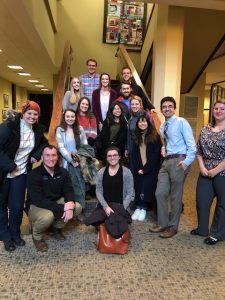July 8, 2020
 UNC Eshelman School of Pharmacy students teamed up with UNC medical and public health students to make a difference in the lives of Western North Carolina residents during the COVID-19 pandemic.
UNC Eshelman School of Pharmacy students teamed up with UNC medical and public health students to make a difference in the lives of Western North Carolina residents during the COVID-19 pandemic.
Together, the students completed an interprofessional rotation in Western North Carolina called the “Rural Interprofessional Response to COVID-19.” Four Pharm.D. students, five medical students and nine public health students were placed into teams and worked on real-world problems as it pertained to meeting the needs of communities that were vulnerable to negative outcomes during the health crisis.
The teams focused on five areas: older adults (addressing social isolation), migrant farm workers, incarcerated individuals, people experiencing homelessness, and personal protective equipment regional needs. Together, they helped with COVID-19 testing in vulnerable areas and calling home-bound seniors for wellness checks, to name a few.
“In collaboration with the Mountain Area Health Education Center, our students worked with local non-profits, city and county governments, and residents across Western North Carolina. They engaged in true, interprofessional teamwork, learning with, from and about each other while utilizing their collective strengths to make an impact,” said Stephanie Kiser, rotation lead and director of the School’s Rural Health program based in Asheville, N.C.
During the four-week rotation, students focused on several learning objectives, including developing an appreciation of the roles, methods and contributions of public health agencies and primary care providers in the community as they respond to an infectious disease crisis. Together, they leveraged interprofessional public health teams to address limiting the spread of COVID-19 through enhanced testing, education and the distribution of resources and experienced the unique challenges of pandemic control in rural and medically underserved areas.
“The rotation offered unique and insightful experiences related to addressing community challenges in the face of COVID-19,” said student Taylor Galyean. “My interprofessional team worked toward addressing challenges that persons experiencing homelessness face. We benefited greatly by focusing on social determinants of health. We also dove into person-centered language, with the public health students conveying the importance of incorporating person-centered language into our vocabulary as health care professionals. This reiterated that people are not defined by their circumstances nor health conditions. This experience opened my eyes to how different perspectives and approaches of interprofessional team members can come together to solve problems more effectively. The emphasis placed on learning “with, from and about” one another drove home the true heart of interprofessional learning and practice.”
Students also participated in weekly didactic sessions, and volunteer faculty members held weekly planning and debriefing sessions. All three schools had faculty participating in the rotation and the entire curriculum was envisioned and launched in about a week.
“We plan to continue this work in the future,” Kiser said. “COVID-19 was simply the catalyst that accelerated our work that was in progress.”
Kiser said the three schools are planning future practice and community-based experiences like this one, both virtual and in-person. They hope to refine the curriculum in the meantime and continue to partner with rural communities/practices facing resource limitations and health disparities.
Latest News

Dean Angela Kashuba receives Carolina Alumni Faculty Service Award

RASP poster presentations capture student research


